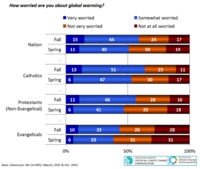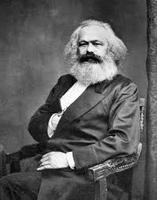Search
40 items
-
Pope Francis and Environmental Leaders Forge Vision for Global Action
Environmental leaders, activists and advocates gathered with Pope Francis for a two-day Vatican-organized conference with hopes to emerge with a shared vision for protecting our planet. The conference was inspired by the third anniversary of the Pope’s encyclical and was attended by political and religious leaders, scientists, economists and heads of civil society organizations. Inspired by the call for unity and action in the encyclical, UN Environment also introduced their Interfaith Rain-forest Initiative at the conference. -
Church of England to Divest from Companies that Neglect Paris Agreement Goals
The Church of England will divest its $16 billion fund from companies that are not aligning themselves with the goals of the Paris Agreement. The decision, which passed by a majority of 347 to 4 votes, states that the church will sell its stakes in companies that do not taking steps towards climate goals by 2023. The website of the Church of England offers the following message: “We believe that responding to climate change is an essential part of our responsibility to safeguard God’s creation. Our environmental campaign exists to enable the whole church to address—in faith, practice and mission—the issue of climate change.” -
Canadian Ecumenical Document Embraces Christian Concern for Environment
On July 23, 2019, the Roman Catholic-United Church of Canada Dialogue in Canada released "The Hope Within Us," a document that focuses on climate change and ecological degradation. The statement urges Christian churches to put aside their differences and work in communion to acknowledge the downside of progress and greed of our economic and political systems as they negatively impact our environment. -
Presbyterians and Climate Change
This article posted on Yale Climate Connections discusses grassroots efforts of Presbyterian organizations, and notes specific time frames of salient Presbyterian accomplishments with regard to climate change. The following excerpt provides a general overview of their goals and mission:
"Presbyterians are engaged in many activities to combat climate change, from Earth Forums to hunger programs addressing food and climate crises and protests against practices that encourage reliance on coal. Since 2010, the Presbyterian Church has given 80 congregations an Earth Care Congregation Certification for demonstrating a strong commitment to environmental care." -
Baptists and Climate Change
Among the Series on Climate Change and Major Religions, this Baptists and Climate Change article serves as a message to all Baptists. Despite their wide range of views and beliefs on environmental issues, the authors urge individuals to come together and take action to care for creation as God had intended. The following excerpt highlights the current division among members:
"The apparent contradiction between the Biblical ideals of dominance and stewardship is one of many divisions in Baptist discussions of climate change/global warming. Among more liberal American Baptist churches, members said in recent interviews, hardly anyone is a global warming 'skeptic.' But among Southern Baptists, a backlash against climate leaders is ongoing." -
WCC augments Vatican’s call to address climate emergency
The World Council of Churches (WCC) calls on those in position of power to listen to the urgent protests and take action accordingly. The following is an excerpt from the article, indicating WCC's stance of solidarity with Vatican’s Dicastery promotion of integral human development:
“When we hear the call from the youth and children on the street, the facts from scientists with all the knowledge, the witnesses from indigenous people of the world and the cry from the Earth we must come together as one humanity in a hopeful action of transformation,” said Grape. “In this struggle for climate justice, the WCC is happy to be working in the same direction as the Vatican’s Dicastery for Promoting Integral Human Development. We work together in an open ecumenical spirit to end climate injustice and move to a more peaceful sustainable future.” -
The Pope on Sustainability
An article written in Science Magazine covers the Pope's take on sustainability and environmental accountability. The Pope has inspired other religious leaders to also raise their voice about environmental issues like combating climate change. The introduction of the article notes that:
"The problems that motivate the Vatican are no different from those that concern the scientific community: depletion of nonrenewable resources, loss of ecosystem services, and risks from changing climate. But what the Vatican contributes is the rationale for taking action: because it is our moral responsibility to bequeath a habitable planet to future generations". -
Lutheran, Anglican, Episcopal leaders offer pastoral message on climate change
This message from leaders of the Evangelical Lutheran Church in America (ELCA), Evangelical Lutheran Church in Canada, Anglican Church of Canada, and The Episcopal Church, emphasizes that all individuals have contributed to climate change. However, they offer hope that God himself has not given up on care for creation. They urge individuals to discern opportunities to curb energy use, decrease carbon emissions, and reduce consumer waste. -
Episcopal Church, Church of Sweden, ELCA commitment: "Sustaining hope in the face of climate change"
The heads The Episcopal Church, the Church of Sweden, and the Evangelical Lutheran Church in America (ELCA) signed a joint commitment to climate statement. The following are five salient points from their commitment:
"1) Advocate for national and international policies and regulations that enable a swift transition from dependence on fossil fuels to clean, safe, renewable energy, and for economic systems that are fair and just.
2) Sustain an interfaith, international conversation around climate change and social and economic justice while working to keep climate change in the public’s attention.
3) Encourage our faith communities to deeper theological reflection on the moral and ethical response to climate change, and then to make public witness about climate change through advocacy at the local, national and international levels.
4) Invite our communities to prayerfully consider how their own actions, lifestyle choices – particularly our energy consumption -- affect the environment.
5) Offer our communities continued opportunities to learn about climate change and the universal church’s response to this crisis." -
A Sinking Island
Many people who currently inhabit one of four small islands in the Pacific Ocean are being forced to evacuate their homes. The rising sea levels have washed away their homes and eroded their beaches. In addition, their sources of freshwater are being contaminated. This unfortunate circumstance is a prime example of Pope Francis's message on the impact of climate change. -
Faith Community Impacts on Earth Day
Since the founding of Earth Day in 1970, faith communities have become more and more involved with the activities of the day. Various religions have taken the lessons to heart, urging individuals to be more aware of their personal impact on the environment as well as their impacts as a community. The focus of Earth Day for 2008 is climate change and its detrimental effects have become pressing issues for the world community -
A Hymn for Hurrican Relief
This article was written to showcase the hymn that was a tribute to prayers for the damage from the recent severe storms in Texas, Louisiana, Nepal, India, Bangladesh, the Caribbean, Florida, Georgia, and South Carolina. In addition to comforting those impacted by the storms, the hymn also serves as a message for government leaders to work for policies that help to counter climate change. -
The People’s Pilgrimage
COP-21 was recently held in Paris, where leaders from countries all over the world met to discuss potential climate change plans. In addition, hundreds of thousands of people of various faiths made their way to the convention. They journeyed to Paris in a pilgrimage of solidarity. People of all faiths were in attendance to rally together and show how religious consciousness is now linked with environmental stewardship.
One group walked 1,500 km. from Rome to Paris. Among this group was Yeb Saño, the representative of the Philippines in COP-19. He has become a well-known activist, as his homeland was ravaged by Typhoon Haiyan during COP-19. The pilgrimage brought copies of Laudato Si, the Islamic Declaration on Global Climate Change, and the Buddhist Climate Change Statement to World Leaders 2015 to show how invested the faith communities are when it comes to climate change and environmental issues. -
The Francis Effect
With the release of Laudato Si’ and the visitation of Pope Francis to the United States, there has been a noticeable increase in the number of both Americans and Catholic Americans who have demonstrated concern over Climate Change. Individuals of various faiths have expressed more trust the Pope due to the overwhelmingly positive reception of his message. -
The World on Fire: A Buddhist Response to the Environmental Crisis
The World on Fire: A Buddhist Response to the Environmental Crisis by Katie Javanaud explores how Buddhist teachings can inspire environmental activism. Javanaud examines key Buddhist sermons, such as the "Fire Sermon," which metaphorically portrays the world consumed by the flames of greed, hatred, and delusion, resonating deeply with contemporary environmental challenges.
Greed is identified as a driving force behind the environmental crisis, fueling overconsumption and disregard for ecological balance. Javanaud illustrates how Buddhist principles offer insights to counteract societal norms of materialism and promote mindful living.
The article addresses common objections to applying Buddhist teachings to environmentalism, providing valuable perspectives for those interested in integrating spirituality with environmental activism. This article serves as a concise introduction to Buddhist environmentalism, offering clarity on the compatibility of Buddhist values with ecological stewardship. -
In Threatened Island Nation, Pope Hears Plea for Climate Action
Pope Francis visited Papua New Guinea, a Pacific Island nation facing serious environmental issues including water pollution, sea level rise, and deforestation. This continued his involvement in the discussion on climate change as he met with governor general Bob Dadae and spoke at meetings. The article covers the Pope's visit, the environmental challenges facing Papua New Guinea, and the ties between religious positions and care for the environment and people who are affected by climate change. -
Our Moral Opportunity on Climate Change
On November 3, 2017, the New York Times posted an article by Justin Welby, the archbishop of Canterbury and primate of the Church of England, discussing some of the devastating weather-related disasters that had occurred at that time and how climate change factored into the tragedies. Below is one section of the article, discussing responses of various faith groups with regard to these events:
"Indeed, even amid the hurricane-caused devastation and despair of recent weeks, I have seen seeds of hope. Different expressions of the Christian faith are freshly united around the need to care for our common home. The Catholic, Anglican and Orthodox Churches just came together with the World Council of Churches to celebrate a month long Season of Creation. During this season, people all around the globe prayed and acted to address climate change and to protect the earth." -
Episcopalians Confronting Climate Change
This article discusses American Episcopalians' concern over climate change and the impact with regard to those facing poverty. The introduction to the article is stated below:
"In September 2011, the House of Bishops in the Episcopal Church, attending a meeting in Quito, Ecuador, sent a pastoral letter to Episcopal clergy worldwide expressing 'mounting urgency' to address climate change within church membership. The letter argued the critical need for Christians to care for all of God’s creation and urged that justice be sought for the poor, who it said will suffer most from climate change." -
Preachable Moments: Evangelical Christians and Climate Change
This article by Yale Climate Connections provides encouraging news of how some evangelical Christians are re-examining their stance on climate change. The following is an excerpt from the article:
"About 60 percent of evangelicals think climate change has nothing to do with human activities. By comparison, less than half of all Americans, or 47 percent, share that view. (Both figures are in sharp contrast to the overwhelming majority of climate scientists who agree that climate change is occurring and primarily caused by human actions).
Richard Cizik sees climate change as ‘top-tier issue’ for younger evangelicals. But the theological doors are beginning to open. Signs are that more evangelicals now are addressing climate change as a moral issue that appeals to the conscience of their Christian communities." -
Lutherans Reflect on Climate Change Conference in Copenhagen
This article discusses some of the sentiments regarding proceedings from the 2009 United Nations Climate Change Conference in Copenhagen. While some attendees expressed disappointment in the outcome, others were more optimistic about steps which may lead to more effective action for climate change in the future. The following excerpt provides a brief description of the event:
"More than 3,000 ELCA members, along with a coalition of U.S. faith leaders, sent some 20,000 postcards to President Barack Obama, urging him to be at the meeting, she said. Obama attended the conference and urged leaders of Brazil, China, India and South Africa to join the United States 'to fund developing nations' projects to deal with droughts,
floods and other impacts of climate change, and to develop clean energy,' among other agreements, according to a U.N. news release." -
Why Lutherans Care for Creation
This article discusses how various concepts of Lutheran theology are woven into ecological messages with regard to God as creator, human interactions, and ways of worship. The following is a section from the introduction of the article, emphasizing human responsibility towards care for the Earth:
"For Christians, care of the Earth is not an 'environmental cause.' Rather, it is central to our holy calling to treasure the Earth and to care for it as our common home, fully integrating creation-care into our love of God and neighbor. Without sacrificing the transformational effects of the 16th-century Reformation, we are called to embrace an eco-reformation that will re-examine and rethink how we read the Bible, how we can expand the scope of our theology, how we can reconfigure our personal vocation and our common ethic, how we worship, how we organize our church life together, and how we understand ourselves as creatures within creation as a whole. This call to continuing reformation is for the whole church, not solely for the committed. Earth care is not an add-on. It is not just for those who happen to be interested in it. It is a call for all Christians to participate in this great work of our time." -
Resources for Preaching & Speaking on Climate Change
The resource gives information for preachers and other religious figures to use when talking about climate change. It starts by giving reasons for preaching about climate change and why it is important for us now and in the future. It also gives facts from scientists on the climate which mentions the aspects of climate change such as the causes and effects on the environment, and what humans can do to help. The article then gives biblical themes related to climate change and also gives advice for religious leaders to overcome possible barriers when preaching. -
Ancient Judean Dates
A date tree planted in Ketura, Israel from 2000 year old seeds found at an archeological site in the Judean wilderness has finally bore fruit earlier this month (September 2020). The harvest was hailed a modern miracle of science. “In these troubled times of climate change, pollution and species dying out at alarming rates, to bring something back to life from dormancy is so symbolic,”... Date palms were praised in the Bible and the Quran, and became symbols of beauty, precious shade and succulent plenty. -
What Karl Marx has to say about today's environmental problems
Ted Benton, a Professor of Sociology at the University of Essex, writes about how Marx's theories can be applied to modern environmental issues such as climate change. He talks about how Marx's ideas about capitalism relate to current exploitation of nature, and specifically about soil degradation which was an issue during the 1860s when Marx was alive. He also includes problematic parts of Marx's attitudes towards nature, such as his praise of increased productivity of land that may have inspired Stalin. -
How Buddhist monks in Ladakh are fighting climate change
Buddhists Monks in the Himalayas are taking a stand to climate change. On Earth Day 2018, thousands of people came together in the village of Yerat to plant trees. The region is rapidly losing glaciers, causing a shortage in water supply to the villages in the area who rely on snowmelt for water. The volunteers were inspired to participate due to their devotion to His Holiness Kyabgön Chetsang Rinpoche and his vision for "a more verdant and organic Ladakh."

























